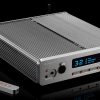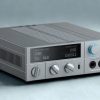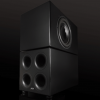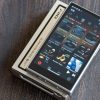Hack #9 from PC Hacks by Jim Aspinwall (O’Reilly Media).
You may be able to find a BIOS upgrade to work around that unhackable, squeaky-clean OEM BIOS.
By this point you may have discovered which feature hacks your BIOS supports, if any. Your PC may contain a “dummied-down” BIOS that provides very few setup options to choose from, while a truly hackable BIOS will give you parameters aplenty.
Most “no name,” “white box,” do-it-yourself PC system boards come littered with hackable bits through switches, jumpers, or the BIOS. These boards are the subject of the majority of hacks, overclocking, modifications, BIOS upgrades, and just plain “geeking out” on what a PC can be made to do. You’ll get hours of enjoyment fiddling with every bit and parameter you can find and perhaps encounter hours or days of frustration if one of your hacks causes you to lose data or massive quantities of that soft, furry stuff atop your head.
If you’ve got an “OEM system”–one with a recognizable and sustained brand name such as Compaq, Dell, Gateway, HP, IBM, NEC, Sony, or Toshiba–chances are you will not find any parameters worth hacking on–you’ve got a “dummied down” BIOS.
The unhackable BIOS exists for one very simple reason: the manufacturer wants this PC to work for the broadest, simplest set of PC users. In other words, it does not want to have to bear the cost of support calls related to hacked BIOS settings. Completely understandable if this is a family PC but very frustrating if you’re a real techie and wish to experiment.
All hope may not be lost. Many vendors use the same or a similar version of system boards that you can get off the shelf or by mail order. For instance, I have an HP Pavilion system that uses an Asus A7V-M and by coincidence an individually boxed Asus A7V I bought to build into my own case. The HP Pavilion A7V-M board uses a “dummied down” Award BIOS, while the boxed board uses a fully hackable Award BIOS. The “dummied down” BIOS in the HP does not allow me to change CPU or memory timing, which are critical to the overclocking hacks [Hack #25] and [Hack #27].
BIOS upgrades can afford you the benefit of new hacking capabilities, provide fixes to known bugs, or provide support for newer features and hardware such as larger hard drives. Furthermore, these upgrades may come with bootable CD-ROM support that may not be included in the original BIOS.
If the P.O.S.T. display for your system board does not show either the AMI, Award, MR BIOS, or Phoenix brand name as appears in Figure 1-11 when it boots up, you’re probably stuck–no hacking allowed. If you do see the brand name of the BIOS you may be in luck, as you may be able to take advantage of this Hack by getting an upgraded BIOS from Unicore at http://www.unicore.com.

Figure 1-11. A typical Award BIOS boot screen. The true version number of the BIOS is shown in the lower left corner
Unicore provides a small program they call the BIOS Agent that can sniff out details of your present BIOS. They also have a list of tips to identify your BIOS if their program cannot do it. The best way to identify your Award BIOS is from the absolute version number that appears at the bottom of your screen at boot time, as shown in Figure 1-12. You can press the Pause/Break key on most PCs to stop the system from booting up so you can copy down this information. From that information, their sales department can tell you if they can provide an upgraded BIOS, and perhaps what additional features you might get with it.
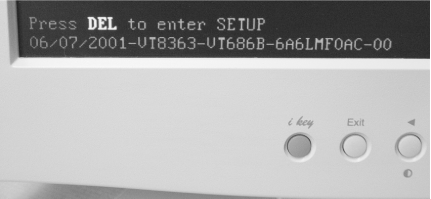
Figure 1-12. The BIOS version number information for a PC with Award BIOS
The unfortunate part of getting a new BIOS from Unicore is that you cannot merely download the BIOS code and upload it into your PC as you can with BIOS updates from the motherboard maker. A Unicore BIOS upgrade will come to you in the mail already installed on a memory chip, which reduces the chances of someone pirating their work. If your system board’s BIOS memory chip is soldered onto the board, as shown in Figure 1-13, or is not mounted in a chip socket, as shown in Figure 1-14, you will likely not be able to purchase a BIOS upgrade from Unicore.
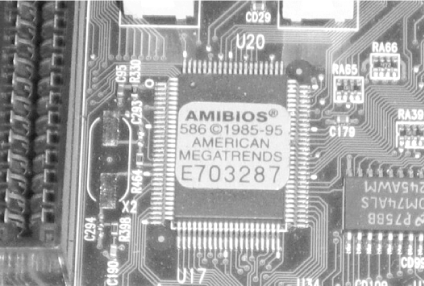
Figure 1-13. This AMIBIOS chip is a FLASH ROM that cannot be removed from the board; it can only be updated electronically
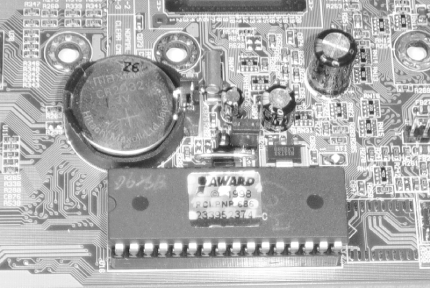
Figure 1-14. A replaceable/upgradeable socket-mounted Award BIOS chip (note CMOS memory battery and CMOS reset jumper above chip)
TIP: You may notice two sets of numbers referring to the version of Award or Phoenix BIOS running your system. The number at the top of the screen–like 4.51, 6.0PG, etc.–is a gross representation of the base BIOS code set used to create the specific BIOS version you have. You will need to locate and note the longer multicharacter number that indicates the specific version for your system board. For Award BIOS this number is almost always displayed in the lower-left corner of the screen. For Phoenix BIOS this number typically appears near the top of the screen with other system board manufacturer’s information.
 This material has been adapted from PC Hacks by Jim Aspinwall, published by O’Reilly Media, Inc. Copyright O’Reilly Media, Inc., 2004. All rights reserved.
This material has been adapted from PC Hacks by Jim Aspinwall, published by O’Reilly Media, Inc. Copyright O’Reilly Media, Inc., 2004. All rights reserved.
Covering both Windows and Linux, PC Hacks combines the bestselling Hacks series style with the world’s most popular computing hardware. Hacks for enhancing performance and preventing problems with your PC include overclocking CPU and video cards, tweaking RAM timing, selecting the best performing components, and more. The guide includes advice on reusing an old PC to off-load work from newer systems as well as ways to prevent security hacks.
PC Hacks is available for purchase from Amazon.com, Amazon.co.uk, Amazon.ca.


